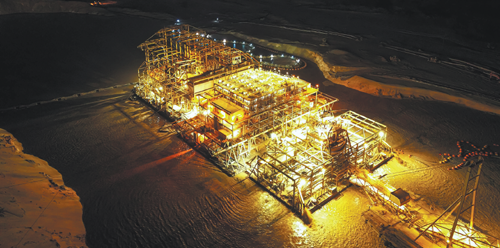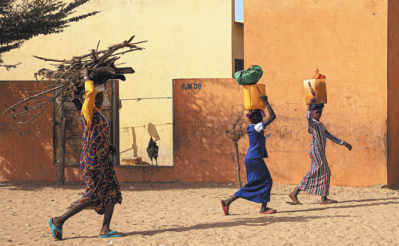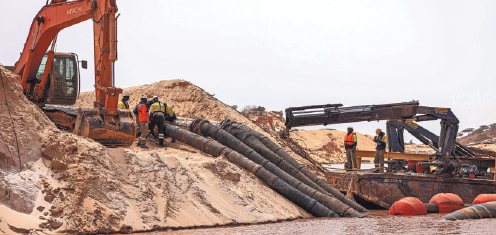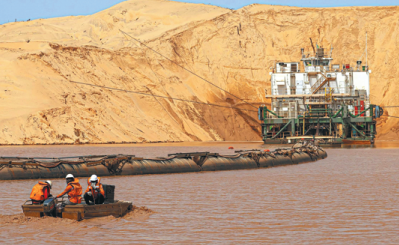DEEP IMPACT

French giant mine machine devours Senegal's fertile coast
The jagged 23-kilometer-long scar that the gigantic rig has left for mining zircon — which is used in ceramics and the building industry — is so big that it is visible from space.
Amid a deafening din, the massive machine sucks up thousands of tons of mineral sands an hour, moving forward on an artificial lake created with water pumped from deep underground.
It is now tearing through the dunes of Lompoul — one of the smallest and most beautiful deserts in the world — a tourist hot spot by the endless beaches of Senegal's Atlantic coast.
Thousands of farmers and their families have been displaced over the past decade to make way for the colossal floating factory run by the French mining group Eramet.
It denies any wrongdoing, insists its operations are exemplary and even plans to step up the pace of mining.
But locals accuse it of destroying this rich but delicate ecosystem on the western edge of Africa's semiarid Sahel Region.
The project has brought "despair and disillusion", said Gora Gaye, the mayor of Diokoul Diawrigne district which takes in Lompoul.
Senegal's President Bassirou Diomaye Faye has also spoken out against extractive mining practices, saying some "local populations do not benefit". He doubled down earlier this month, demanding more transparency and oversight of "social and environmental impacts".
His government was elected last year promising a radical break with the past and to reclaim Senegal's sovereignty, particularly from the influence of former colonial power France.
Eramet Grande Cote, or EGC, Senegalese subsidiary of the Eramet, insisted it was a "responsible company" that has compensated locals "five times more" for the loss of their land than national guidelines, up to $16,575 per hectare.
But what are they left with afterward, asked a hotelier who runs a desert eco-lodge of traditional tents in Lompoul, where until recently the only sounds were from seabirds and passing camels.
"The mine is moving forward: the fate of people once the mine has passed is no longer their problem," he said, the roar of the gigantic dredger 150 meters away almost drowning him out as it ate through the landscape.
Of Lompoul's seven tourist camps, six have accepted Eramet's money and have moved. The hotelier is holding out for "just" compensation for him and his 40 employees.
Losing land
Local communities also accuse the mine of destroying and "degrading the soil and the dunes" and threatening their water and food security.
Farmers say the compensation for the land is based on guidelines dating from the 1970s and does not make up for the irredeemable loss of revenue from their once-fertile fields.
The hollows between the dunes were oases, a rare ecosystem "which produced until recently 80 percent of the fresh vegetables eaten in Senegal", according to mayor Gaye.
Gaye said locals were initially optimistic about the mining.
But all they have gotten were "broken promises, intimidation, the destruction of our ecosystem and the catastrophic moving of villages. Economic development has gone backward", he added.
Gathered in the square of one of the new settlements at Foth, 120 km north of capital Dakar, Omar Keita and around two dozen other heads of families were quick to show their anger.
"We want our land back and our village rebuilt so we can go back to how we were living before," Keita, 32, said.
He said he was not given a new home and showed where his wife and three children have lived for the past six yearsa single room "loaned by my big brother", a mattress lying on the floor.
EGC's managing director Frederic Zanklan insisted that "every family was rehoused in relation to how they were when the count was made", adding that it was "nothing to do" with them if families had since grown.
"Here I have to work in other people's fields," he said.
Ibrahima Ba, 60, was equally livid. "We have gone backward in every way," he said.
While still a farmer, today's harvests are nothing like what they were "in my village, the soil was very fertile, we had fresh water and we had no problems".
He called on President Faye and his prime minister to help them "because a foreign country is destroying the life of Senegalese citizens".
Agencies Via Xinhua




























